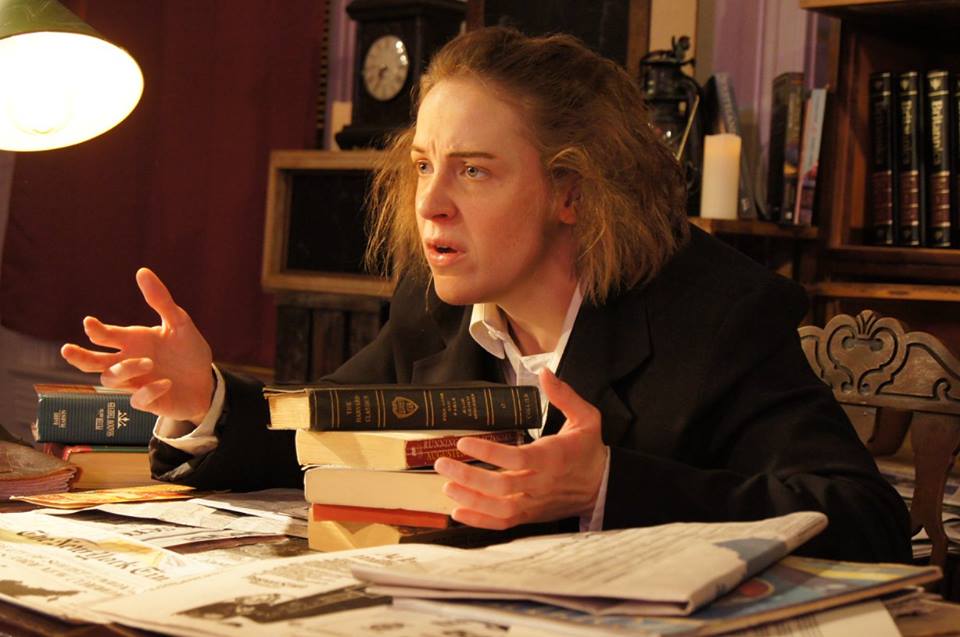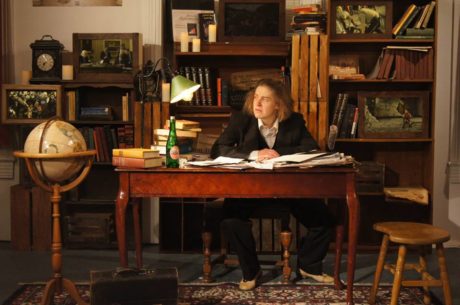Nu Sass’ latest Small Batch production is Howard Zinn’s one-actor Marx in Soho. It is another highly successfully, nervy production by Nu Sass with it mantra, “strong women, great theatre.” It is being performed at its intimate upstairs performance space at Caos on F, with a seating capacity for about 30 comrades-in-arms.
Under the shrewd direction of Angela Kay Pirko, Marx in Soho is, thankfully, not simple nostalgia for a bygone time aimed at Baby Boomers who think themselves ex-revolutionaries from 1968. Pirko has made sure that the production is also not a force-feeding of classic resistance literature like unwanted, but good-for-you, spinach or broccoli for Millennials.

With the gender-blind casting and smoothly assured performance of Mary Myers as the radical thinker of the mid-19th Century Industrial Age, Karl Marx (1843-1881), I was not at a dry dissertation reading. I was not at a reminiscence by an inebriated old man or a fairy-tale about some old-dead-white man.
As Marx, Mary Myers showed that a whole new outlook is possible for the representation of demi-god Karl Marx. He was far from some myth to be worshipped. Myers, with Zinn’s script, made Marx a complicated person who worshipped his family even if he was a lousy provider. With her physical presence and bearing, her humor and even some visible tears, all no more than a few inches from the audience, Myers (in purposely ill-fitting suit by Aubri O’Connor) performed with self-assured ease and confidence. To quote one of the audience I heard as I left the fine performance by Myers; “She was Marx to me!”
As for the story-line of Marx in Soho; well for one brief shining moment Marx has returned from the beyond, to inform that life under 19th century was a mess and that life is not better under present day capitalism. Using Marx’s own writings and speeches, the show aimed to rile things up so something would be done about the capitalist mess and its terror on anyone not of the 1% classes.
As Marx suggested:
Workers of the world unite; you have nothing to lose but your chains.
Other bon mots from Marx that received attention (at least I thought I heard them) in Marx in Soho included:
– Religion is the sigh of the oppressed creature, the heart of a heartless world, just as it is the spirit of a spiritless situation. It is the opium of the people,
– A spectre is haunting Europe – the specre of communism,
– The proletarians have nothing to lose but their chains. They have a world to win.”
Zinn was cunning with his script for Marx in Soho. He did not emphasize Marx as a theorist and polemicist over Marx the family man, though with a roving eye. With Myers as Marx, family dynamics take on a strong emphasis. Marx’s brilliant wife Jenny (1814-1881), and equally brilliant daughter Eleanor (“Tussy” 1855-1898) have plenty of warm spotlights come to them. Jenny and Tussy exposed Marx to himself as a man with plenty of weakness as a writer and speaker. In these Marx in Soho “family” scenes as Marx speaks of his wife and daughter, the production becomes a marvelous crash course in the value of dialectic family arguments to establish some truth through reasoned discussion. Zinn may have written the script, but it is Myers who delivers the goods with ease and confidence.
But, the Zinn script can at times be a bit like a long-winded, college-level course with lines taken from the Communist Manifesto and Das Kaptial. Thankfully Zinn softened his sometimes lecturing mode with humor. including verbal battles between Marx and his follow radical and nemesis Mikhail Bakunin. Rolling about the floor, Myers is a delightful hoot portraying Marx and Bukunin in a frenzy.
The comfy, drawing room set is designed by Jessica Cancino with lighting design by E-Hui, and the striking sound design by Hope Villanueva.
Zinn assumed that Marx would have distain and distaste for Stalin, though Marx was dead by the time Stalin came to power with Lenin in 1917. Myers makes the presumed disdain visual with a flourish. As for Karl Marx’s real physical infirmities, well, Myers slow, deliberate movements made them quite apparent.
So here we are in March 2017. It is one hundred years since the Marxist-Leninist Russian Revolution of 1917.As Marx says in Marx in Soho:
If anything is certain, it is that I myself am not a Marxist.
Nu Sass’s production of Marx in Soho is weighty and illuminating. Aubri O’Connor was the production’s lead producer and Angelika Pirko the co-producer.

The show did what I often enjoy – it made me think about bigger things. Does Karl Marx offer anything for us for resistance to current times and events? As Nu Sass marketing materials suggest:
The time is now; the place is here; and Karl Marx is back from the dead to tell us exactly what he thinks of what we’ve made of our world.
Is his socialist theory as a valid philosophy in these times? Will the revolution be resurrected?
All I can add is this: So here we are in March 2017. It is one hundred years since the Marxist-Leninist Russian Revolution of 1917.
As Marx says in Marx in Soho:
If anything is certain, it is that I myself am not a Marxist.
I do trust that many will see the production and then have some drinks after to discuss the matter and let me know. So after you see Marx in Soho, let me know what you think by leaving a comment in the Comment Box at the bottom of this review.
Running Time: Approximately 90 minutes, with no intermission.
Marx in Soho, plays through April 2, 2017, at Nu Sass Productions performing at Caos on F Street – 923 F Street, NW, in Washington, DC. For tickets, purchase them online.
NOTE: Eleanor Marx translated into English Ibsen’s play Enemy of the People, a phrase that the new Trump Administration recently used to describe the mainstream media.





